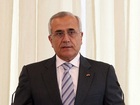Former Prime Minister Saad Hariri rejected accusations that the March 14 camp is arming the Syrian opposition, reported the pan-Arab daily al-Hayat on Saturday.
He told the daily: “We provide it with humanitarian and political support.”
 Full Story
Full Story
Head of the Lebanese Forces Samir Geagea noted on Friday that the greatest progress in the Palestinian cause could have been achieved during the Arab Spring.
He said during a workshop on "Lebanon's role in the renaissance of the new Arab world": “The other camp is using the Palestinian cause to suit their interests.”
 Full Story
Full Story
Foreign Minister Adnan Mansour announced Friday that he “will not support a camp against another” during his chairmanship of the current session of the Arab League, saying he does not care about the domestic “overbidding” in this regard.
“Lebanon will not enter the mazes of Arab politics and will not support a camp against another,” Mansour said in an interview with NBN television.
 Full Story
Full Story
President Michel Suleiman met with Syrian Prime Minister Wael Nader al-Halqi and Foreign Minister Walid al-Muallem on the sidelines of the Non-Aligned Movement summit in Tehran last week, al-Akhbar newspaper reported on Friday.
The daily said that the Syrian officials gave explanations to Suleiman on the case of former Minister Michel Samaha who was arrested last month on charges of plotting to carry out bombings in Lebanon with Syrian help.
 Full Story
Full Story
Sharp differences among cabinet members over the new wages scale forced the postponement of the controversial issue as ministers were divided between those holding onto a deal agreed with the public sector and others arguing that the percentage hike should be decreased as the state treasury can’t endure it, local newspapers reported on Thursday.
The cabinet session on Wednesday witnessed sharp debate between Hizbullah and AMAL Movement ministers and President Michel Suleiman, Prime Minister Najib Miqati and National Struggle Front ministers, who are loyal to Progressive Socialist Party leader MP Walid Jumblat, over the percentage of the new salaries increase for the public sector employees.
 Full Story
Full Story
The March 14 forces on Wednesday announced the creation of a permanent consultative body aimed at confronting the threats facing Lebanon, urging President Michel Suleiman and “all the free, loyal Lebanese” to take part in defending the country.
“The conferees agreed that there are four main threats that require political, popular and parliamentary mobilization before it is too late,” said a statement issued after a broad meeting for the March 14 forces in Maarab.
 Full Story
Full Story
The March 14 opposition has criticized Prime Minister Najib Miqati for asking Lebanon’s ambassador to Damascus to relay to Syrian authorities “objections” over the shelling of Lebanese border towns, a ministerial source said on Tuesday.
The source told al-Liwaa newspaper that Miqati’s request neither included a complaint nor a protest.
 Full Story
Full Story
The head of the Mustaqbal parliamentary bloc MP Fouad Saniora handed on Tuesday President Michel Suleiman a March 14 memo that reiterates the opposition’s call for the expulsion of Syrian Ambassador to Lebanon Ali Abdul Karim Ali and the control of the Lebanese border with Syria through U.N. help.
The memorandum also called for the formation of a national salvation government and filing a complaint to the Arab League over Syria’s repeated border violations.
 Full Story
Full Story
President Michel Suleiman praised on Monday the army on its efforts in defending Lebanon and maintaining civil peace.
He stressed on the anniversary of the end of the Nahr al-Bared clashes the “importance of internal unity and national will in allowing the security forces and army in fulfilling their duties towards the nation and people.”
 Full Story
Full Story
President Michel Suleiman signed on Saturday the new electoral draft law and referred it to the parliament, the National News Agency.
The new electoral draft-law, which was approved by the cabinet in August, is based on proportional representation and divides Lebanon to 13 districts in the 2013 parliamentary elections although it is not likely to be approved once referred to the parliament as it was criticized by al-Mustaqbal movement and the Progressive Socialist Party.
 Full Story
Full Story



